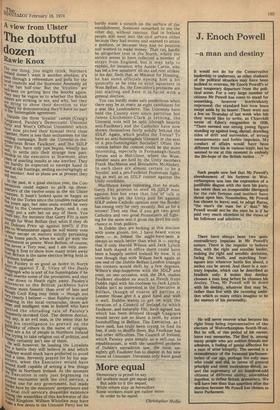J. Enoch Powell
—a man and destiny
It would not do for the Conservative leadership to underrate, as other students of the political situation may have been inclined to overrate, Mr Enoch Powell's at least temporary departure from the political scene. For a very large number of citizens Mr Powell has come to stand for something, however inarticulately expressed: the standard has now been swept aside by its bearer. There were not a few on Thursday of last week who felt they would like to write, as Churchill wrote of Eden's resignation in 1939, "There seemed one strong young figure standing up against long, dismal, drawling tides of drift and surrender, of wrong measurements and feeble impulses. My conduct of affairs would have been different from his in various ways; but he seemed to me at this moment to embody the life-hope of the British nation ..."
Such people now feel that Mr Powell's abandonment of his fortress in Wolverhampton was Kr's the expression of a justifiable disgust with the turn his party has taken than an irresponsible disregard for the role fortune and instinct have thrust upon him. Nonetheless, Mr Powell has chosen to leave; and, to adapt Burns, "the man's the man for a' that." Mr Powell would not be the man he is if he paid very much attention to the views of his followers and admirers.
There have always been two quite contradictory impulses in Mr Powell's nature. There is the impulse to believe that, with the right and sensible leader, making the right and sensible decisions, facing the truth, and marching foursquare into whatever battle lies ahead, a nation can be saved. And there is a contrary impulse, which can be described as fatalistic only: it insists that destiny chooses a man long before he chooses his destiny. Thus, Mr Powell will lie down with his destiny, whatever that may be, rather than live with the ravening ambition which so many critics imagine to be the essence of his personality.
He will never recover what became his right from being representative of the electors of Wolverhampton South-West. But he will, of this period of his career, leave two memories. The first is, among many people who are neither friends nor admirers, a feeling of genial affection for a man of utter integrity. The second is a remembrance of the foremost parliamentarian of our age, perhaps the only man who could and did, in terms of general principle and most meticulous detail, assert the supremacy of six hundred-odd citizens of different ability, assembled together, to define British democracy. We will have less than that assertion after the election; because Mr Powell has chosen to leave Parliament.


































 Previous page
Previous page